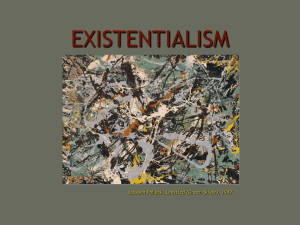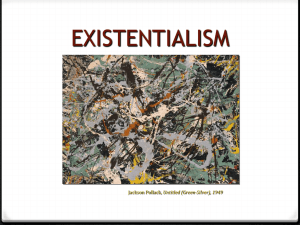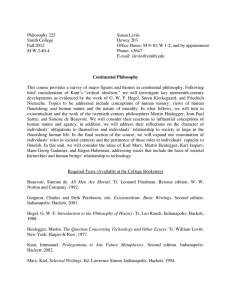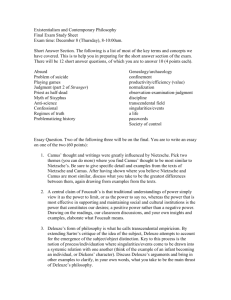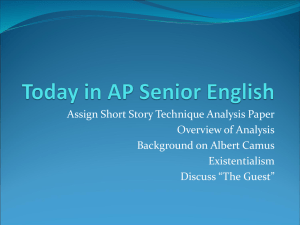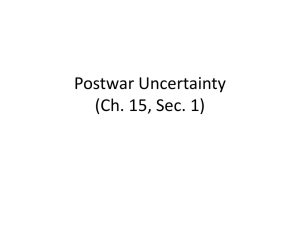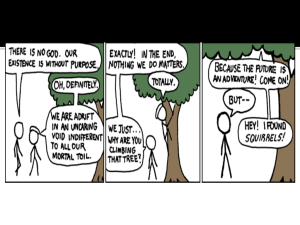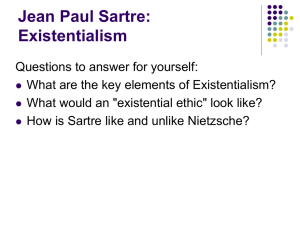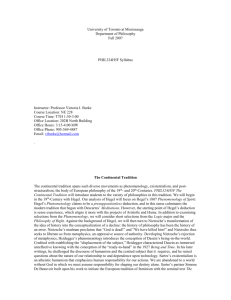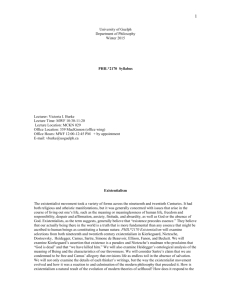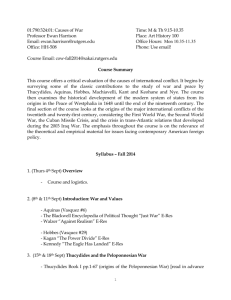EXISTENTIALISM
advertisement
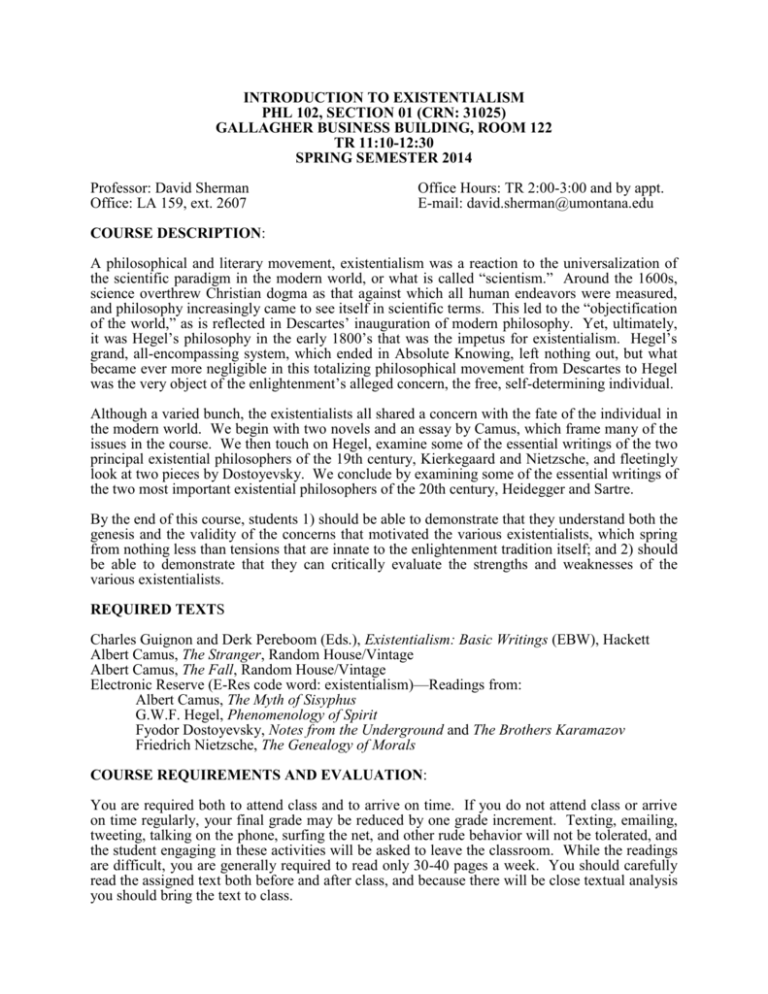
INTRODUCTION TO EXISTENTIALISM PHL 102, SECTION 01 (CRN: 31025) GALLAGHER BUSINESS BUILDING, ROOM 122 TR 11:10-12:30 SPRING SEMESTER 2014 Professor: David Sherman Office: LA 159, ext. 2607 Office Hours: TR 2:00-3:00 and by appt. E-mail: david.sherman@umontana.edu COURSE DESCRIPTION: A philosophical and literary movement, existentialism was a reaction to the universalization of the scientific paradigm in the modern world, or what is called “scientism.” Around the 1600s, science overthrew Christian dogma as that against which all human endeavors were measured, and philosophy increasingly came to see itself in scientific terms. This led to the “objectification of the world,” as is reflected in Descartes’ inauguration of modern philosophy. Yet, ultimately, it was Hegel’s philosophy in the early 1800’s that was the impetus for existentialism. Hegel’s grand, all-encompassing system, which ended in Absolute Knowing, left nothing out, but what became ever more negligible in this totalizing philosophical movement from Descartes to Hegel was the very object of the enlightenment’s alleged concern, the free, self-determining individual. Although a varied bunch, the existentialists all shared a concern with the fate of the individual in the modern world. We begin with two novels and an essay by Camus, which frame many of the issues in the course. We then touch on Hegel, examine some of the essential writings of the two principal existential philosophers of the 19th century, Kierkegaard and Nietzsche, and fleetingly look at two pieces by Dostoyevsky. We conclude by examining some of the essential writings of the two most important existential philosophers of the 20th century, Heidegger and Sartre. By the end of this course, students 1) should be able to demonstrate that they understand both the genesis and the validity of the concerns that motivated the various existentialists, which spring from nothing less than tensions that are innate to the enlightenment tradition itself; and 2) should be able to demonstrate that they can critically evaluate the strengths and weaknesses of the various existentialists. REQUIRED TEXTS Charles Guignon and Derk Pereboom (Eds.), Existentialism: Basic Writings (EBW), Hackett Albert Camus, The Stranger, Random House/Vintage Albert Camus, The Fall, Random House/Vintage Electronic Reserve (E-Res code word: existentialism)—Readings from: Albert Camus, The Myth of Sisyphus G.W.F. Hegel, Phenomenology of Spirit Fyodor Dostoyevsky, Notes from the Underground and The Brothers Karamazov Friedrich Nietzsche, The Genealogy of Morals COURSE REQUIREMENTS AND EVALUATION: You are required both to attend class and to arrive on time. If you do not attend class or arrive on time regularly, your final grade may be reduced by one grade increment. Texting, emailing, tweeting, talking on the phone, surfing the net, and other rude behavior will not be tolerated, and the student engaging in these activities will be asked to leave the classroom. While the readings are difficult, you are generally required to read only 30-40 pages a week. You should carefully read the assigned text both before and after class, and because there will be close textual analysis you should bring the text to class. Your final grade is based on three exams, each of which is worth one third of your grade. The exams are set for February 27, March 27, and May 12, but I reserve the right to reschedule the first two exams (with at least one week’s notice) if we do not move through the materials at a corresponding speed. Unless evidence of emergency or illness is provided, make-up tests will not be arranged. Students with disabilities may request reasonable modifications by contacting me. UM assures equal access to instruction through collaboration between students with disabilities, instructors, and Disability Services for Students (DSS). “Reasonable” means UM permits no fundamental alterations of academic standards or retroactive modifications. TENTATIVE SCHEDULE: WEEK: READINGS (from EBW unless indicated otherwise): Jan 28 Jan 30 Introduction to Existentialism Camus, The Stranger Feb 4 Feb 6 Camus, “The Myth of Sisyphus” (E-Res: 1-12) Camus, The Fall Feb 11 Feb 13 Hegel (19-25) Hegel (E-Res: 13-22)/Introduction to Kierkegaard Feb 18 Feb 20 Kierkegaard (26-55) Kierkegaard (55-77) Feb 25 Feb 27 Kierkegaard (78-92) FIRST EXAM Mar 4 Mar 6 Nietzsche (119-142) Nietzsche (142-148) Mar 11 Mar 13 Nietzsche (148-160) Nietzsche (160-171) Mar 18 Mar 20 Nietzsche (172-181) Nietzsche, Master and Slave Morality (E-Res: 57-86) Mar 25 Mar 27 Dostoyevsky, Underground Man/Grand Inquisitor (E-Res: 23-56) SECOND EXAM Apr 1/3 SPRING BREAK Apr 8 Apr 10 From Husserl to Heidegger Heidegger (211-219) Apr 15 Apr 17 Heidegger (219-230) Heidegger (230-246) Apr 22 Apr 24 Heidegger (246-254) Sartre’s Early Phenomenology Apr 29 Sartre (290-308) May 1 Sartre (309-328) May 6 May 8 Sartre (328-348) Sartre (348-362) May 12 (Monday) THIRD EXAM (8:10-9:30)
